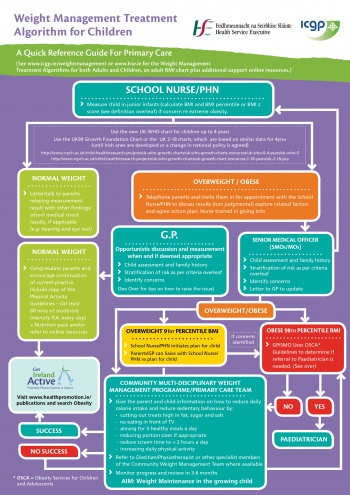CHILD HEALTH
Weight management algorithm for children
The HSE is introducing growth monitoring on a trial basis in four areas with a view to intervention and help for families with children who are obese
October 1, 2014
-
Last year the ICGP Quality in Practice Committee signed off on the HSE-ICGP weight management treatment algorithm for children. The HSE plans this winter to commence growth monitoring in four pilot sites, according to Best Health for Children, as part of the school health check in junior/senior infants. Cork (parts of north and south Lee) and Mayo will be the first, followed by Dublin area 15 in the new year. Discussions are underway to finalise the fourth site.
Children of consenting parents will have their height, weight and growth plotted. All parents will receive their child’s results along with those of the sight and hearing tests (where these are available at that time), in a sealed envelope taken home by their child. The results will be accompanied by a self-help booklet for all parents, ie. Eat Smart Move More (for all underweight and normal weight children) or Your Child’s Weight a Guide to Preventing Childhood Obesity (for overweight and obese children).
Parents of underweight children will be offered an appropriate referral by the school nurse/PHN. Parents of overweight children will be followed up for further health promotion advice, referred to online self help resources, ie. visit www.healthpromotion.ie/publications and, www.getirelandactive.ie or/and community based services or prevention programmes. Obese children (>98th centile) and their parents will be offered a year long community based W82GO Lifestyle Intervention Programme delivered by a multidisciplinary team (MDT) under the local governance of the area senior medical officer, with other team members including a dietitian, psychologist, physiotherapist and physical activity co-ordinator.
This W82GO Lifestyle Intervention Programme has been successfully delivered at the Children’s University Hospital, Temple Street for five years, having achieved results exceeding those in the international literature. The team in Temple Street, led by Sinead Murphy, paediatrician and Grace O Malley, physiotherapist will train the four community based, pilot teams prior to commencement of school growth monitoring. It is planned to screen 1,800 children in each of the four areas with 86-121 clinically obese children referred to the W82GO programme (assuming 6-7% obesity rate with an anticipated 20% declining assistance).
Entrants to the W82GO programme will be confined to children 5-6/6-7 years who are referred via the school nurse. As the programme works with the family, any clinically obese or at risk siblings may also be included. During the pilot phase of this, the W82GO MDT will be wholly committed to supporting these children and their families and will not be in a position to accept referrals from GPs/paediatricians for other children outside the referral criteria.
The HSE acknowledges and supports the unique position of GPs to assist in the fight against obesity through opportunistic discussion, routine measurement and appropriate referral of children as per the algorithm. It is intended to carry out an initial evaluation of the four pilots in July 2015 with final evaluation in autumn 2016.
If successful, the HSE plans to roll out the programme nationally on an incremental basis. Briefing and training sessions are planned for PCTs in each pilot site closer to commencement. Additional supports for health professionals are available on www.hse.ie/weightmanagement. Please send comments or queries to adrienne.lynam@hse.ie
 (click to enlarge)
(click to enlarge)
